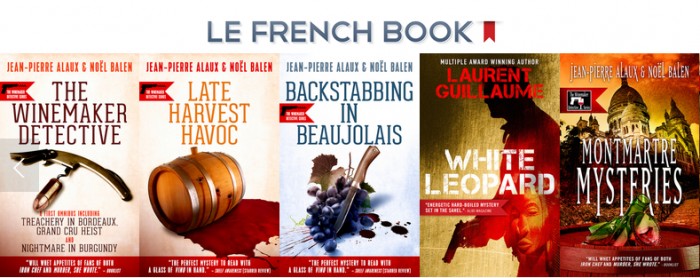Industry Focus: Being Published in France, Part Two, by Anne Trager
Anne Trager has over a quarter of a century of experience working with the French in translation and publishing. She founded Le French Book, a mystery and thriller publishing house dedicated to translating French mysteries and thrillers into English. She is frequently asked about going the other way around, from English into French. Here she shares tips. This is the second of a two-part article.
In part I of this article, I covered the French market and readers. Here, I’ll discuss selling foreign rights to French publishers and whether or not you could/should go it alone.
How to sell your rights in France
French publishers are quite vocal about wanting to work with authors directly, and bypassing agents all together. This of course is easier said than done, but it does open up possibilities for authors. We saw in part I that French publishers translate a lot of foreign literature. A book reporter told me “mysteries and thrillers are all the rage. Now all the publishers are doing the genre and publishing whatever they can get their hands on. Not all of them do it well, but some work with a real passion for the genre. Those are the ones you want to work with.”
Here are some things to keep in mind:
- Approach bigger publishers for mainstream mysteries and thrillers.
- Smaller publishers are currently looking for novelty: off-the-radar approaches, foreign climes (other than the US), cross-genre fiction, and no serial killers or stereotypes. They are looking for books “that haven’t already been written.”
- Study the editorial guidelines.
- Send full manuscripts.
- Do not underestimate the author-publisher relationship.
- Respect options if already translated.
- Go to the Paris Book Fair if you can.
Quirks about France
France, being France, has its oddities. The first is the Lang Law, which regulates book pricing. Once a publisher decides how much a book costs and prints that price on the cover, nobody can sell it for anything less than 5% below that set price. It’s the law.
Literary prizes are very important in France, as is the “rentrée littéraire,” which occurs in fall. Between the end of August and beginning of November, the majority of the year’s books are released.
Finally, there is the French exception. The French are unforeseeable. A book that sold rights in 35 countries can be a flop in France. Lee Child is one example of this (sorry, Lee).
E-books
The French frequently do things in their own time. When it comes to e-books, the pace is slow and steady. Be forewarned that e-books are often priced higher in France, sometimes at the same as the print book, and some publishers do not even publish in e-book format (you’ll want to check on that). What you need to know:
- The e-book market represents 6.4% of book sales in France, concentrated in certain sectors (professional publishing and social sciences). E-books only represent 2.9% of consumer book sales.
- Only 18% of the French population own e-readers.
- Surveys show that e-book readers continue to read in print, and that reading habits are not changing.
- Value added tax in France is 5.5% on print books (a cultural item) and 20% on e-books (which are considered a service).
- Kobo has is a key player in France due to it’s relationship with France’s major bookseller the FNAC.
Self-publishing
What’s missing from all of this? Yes, the word self-publishing. I initially wrote, “There is no market for it in France. End of story.” Then I talked to someone from Amazon France who, of course, told me I was very wrong and that KDP is doing quite well here. I found no statistics. What I can say for sure is that self-publishing a translation requires:
- a) a translation (i.e., an added cost)
- b) editorial adaptation and/or proofreading (i.e., an added cost)
- c) marketing to a French audience (i.e., a knowledge of French, or an added cost)
The way to go would be to tap in to the still-ever-nascent e-book market and perhaps get lucky since it is not that crowded and you may be able to get some visibility. There are ways to get into well-established print distribution networks if that’s what you’re looking for. But as with any self-publishing venture, there’s a lot of work involved. Working with translators and translations is a topic in and of itself.
Conclusion
As with any foreign market, if you can get a publisher, get a publisher. They have trustworthy translators, an editorial process in place, distribution, and the whole works. If your books sell, they’ll get you invited to some of those wonderful book fairs, where you’ll eat good food, drink good wine, and sign books all day long for wonderful fans. Knowing how unpredictable the French are, I’m hesitant to say you can’t do the same with self-publishing, but the obstacles are many.
If you have specific questions about translation, France, French authors, or publishing in France, you can contact Anne Trager at anne@lefrenchbook.com. Le French Book has nearly twenty titles in translation now and a growing catalogue of European mysteries and thrillers in English. Discover them at: www.lefrenchbook.com.er them at: www.lefrenchbook.com.
*****
 Translator Anne Trager loves France so much she has lived there for over a quarter of a century and just can’t seem to leave. What keeps her there is a uniquely French mix of pleasure seeking and creativity. Well, that and the wine. She founded Le French Book to translate the country’s top mysteries and thrillers, so they can reach new readers. The company’s motto is “If we love it, we translate it,” and Anne loves crime fiction, mysteries and detective novels. The Winemaker Detective series was one of her first choices.
Translator Anne Trager loves France so much she has lived there for over a quarter of a century and just can’t seem to leave. What keeps her there is a uniquely French mix of pleasure seeking and creativity. Well, that and the wine. She founded Le French Book to translate the country’s top mysteries and thrillers, so they can reach new readers. The company’s motto is “If we love it, we translate it,” and Anne loves crime fiction, mysteries and detective novels. The Winemaker Detective series was one of her first choices.
- Africa Scene: Iris Mwanza by Michael Sears - December 16, 2024
- Late Checkout by Alan Orloff (VIDEO) - December 11, 2024
- Jack Stewart with Millie Naylor Hast (VIDEO) - December 11, 2024

